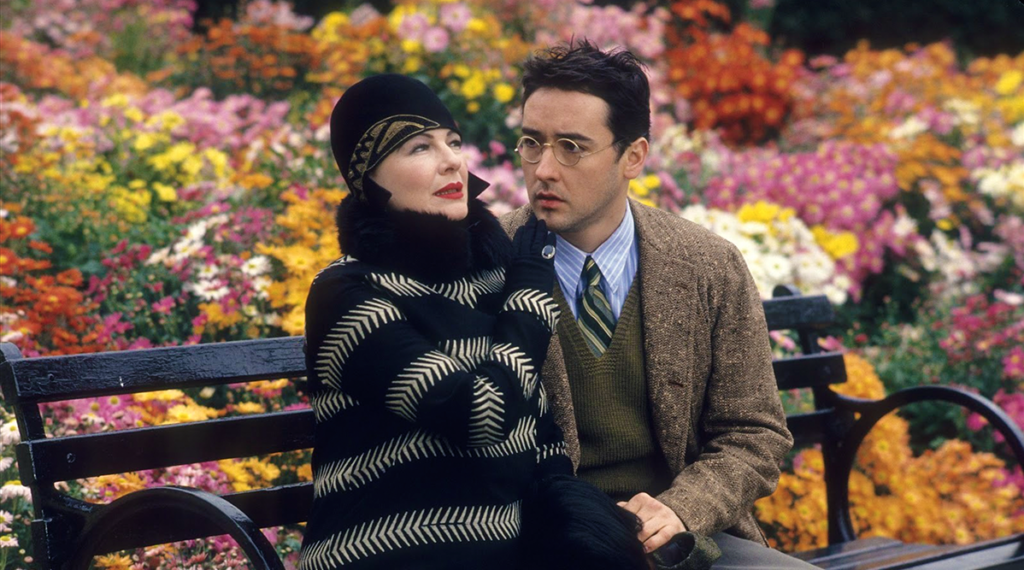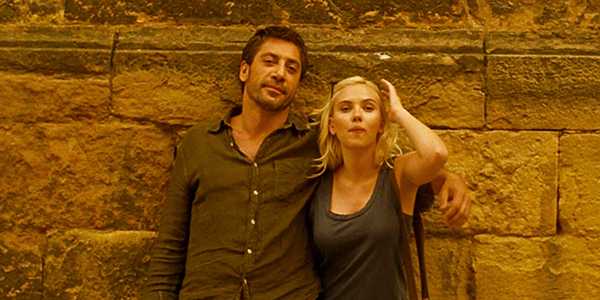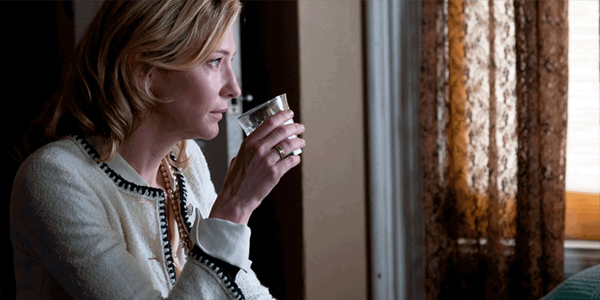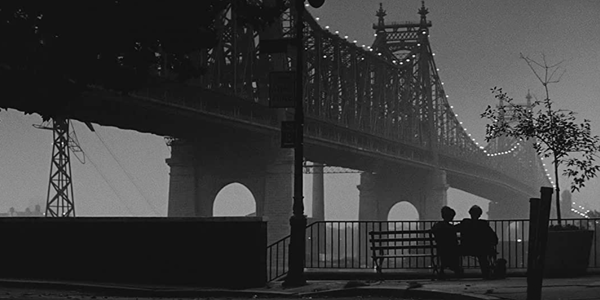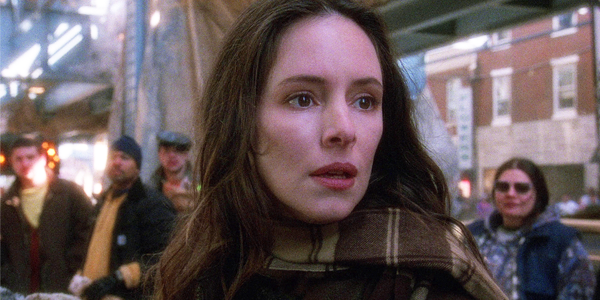related reviews
Sign up for our monthly newsletter
to stay up to date on Cineluxe
One of Woody Allen’s best, this comedy about the absurdity of creating was also one of his last completely satisfying films
by Michael Gaughn
October 17, 2022
Bullets Over Broadway comes from the end of Woody Allen’s last consistently strong period as a filmmaker. After that, and Mighty Aphrodite in 1995, he would wander in the woods for the next three decades, managing to come up with something truly worthy only about once every 10 years. A lot has fed into that protracted “lost” period (some of which I’ll speculate on below) but the sad truth is that, somewhere around 1996, Allen lost touch with the elements essential to sustaining his work.
Bullets shows him radically reinventing himself as a filmmaker, a process he’d begun with Husbands and Wives two years earlier but didn’t fully realize until this film. He succeeds mightily, forging a vigorous and responsive and seemingly resilient style that consistently heightens the material. Why he wasn’t able to carry forward and build on what he’d wrought and why it instead led to embarrassing messes like Everyone Says I Love You just two years on remains one of the great mysteries. Allen must have kept the formula in a jar somewhere, though, since he was able to bring it to bear again, in full force, almost 15 years later for Vicky Cristina Barcelona.
In Bullets, he took a looser, higher-stakes approach to his fondness for long-take master shots and semi-improvisational dialogue and applied it to larger, more diverse ensembles in a way that essentially drove the whole work. It’s a nervy form of filmmaking, one that could have easily unraveled if he hadn’t had sufficient confidence in his abilities. It also could have easily become mannered, but applied to the world of Broadway theater, and to the crafting of a play in particular, it feels like a natural extension of the fictional environment.
But there are frustrations. Allen, with his career-long belief that the best way to keep material fresh is to avoid working it too hard, rarely lets his scripts steep enough, and there are moments here that feel embryonic rather than fully fledged and gags that just feel like gags instead of arising naturally from the situations.
It also takes a few minutes for Bullets to get up on its feet, partly because of its unusual visual style, which ultimately yields big dividends but does take some getting used to, but also because Dianne Wiest’s first scene gives the impression she’s going to lean a little too hard on Norma Desmond throughout. Some more screen time needs to pass before it becomes apparent there’s a character there and not just a lot of derivative posturing.
The bigger problem is the inadequate John Cusack in the lead. He doesn’t have the range to convincingly play a self-important struggling playwright, and his failed attempts to rise to the challenge create something of a void at the center of the film. Allen has always relied on casting the flavor of the month as a way of ensuring some box office for his movies—something he slyly comments on in Bullets through the Cusack character’s difficulties with casting his play—but it doesn’t do him any favors here.
Fortunately, the combined efforts of Wiest; a surprisingly strong Jennifer Tilly; Chazz Palminteri, in a nicely modulated performance; the rock-solid Jack Warden; the always enjoyable Jim Broadbent (in an underwritten role); and even Tracy Ullman, during the moments when she’s able to rise above her trademark schtick, more than compensate for the presence of the seemingly lost Cusack.
Thanks to Palminteri, Bullets includes one of the best moments in all of Allen’s work as he and Cusack sit at the counter in a pool hall talking about writing. It’s a seemingly simple scene but the way Palminteri begins to open up, convincingly showing his character is something more than a stereotypical goon, the whole accompanied by the tapping of cues and crack of billiard balls, becomes the almost imperceptible pivot for the whole film. (Allen would largely recapture this 22 years on in a couple of the key exchanges between Jesse Eisenberg and the otherwise unexceptional Blake Lively in Café Society.)
Of all the older movies I’ve looked at recently, Bullets Over Broadway most cries out for a better presentation. Not that it’s unwatchable in HD on Prime but the saturated, constantly bordering on soft, heavy on grain images are ill served by this jittery transfer. Some scenes, like one between Warden and Cusack in a steam bath and the ones in the mob boss’s apartment, with its vast stretches of off-white walls, are full of distracting noise. Luckily, the cinematography is strong enough to punch its way through how it’s presented here, offering a tantalizing glimpse of how Bullets would likely look if it were treated to a straight 4K transfer.
This is such a good film—one of Allen’s best, although not quite at the level of Annie Hall, Manhattan, or Stardust Memories or the much later Blue Jasmine—that it’s sad Allen wasn’t able to continue to fruitfully mine the vein he’d struck here. You just need to compare Bullets to his effort to cover the same thematic ground in 2005’s Match Point to realize how badly he’s been flailing in his late period.
There are many possible explanations for those struggles, none of them completely satisfying, but I would point to two big factors. The more simplistic one is that Allen always needed an onscreen anima to define his work against—Diane Keaton up to 1980 and the more problematic—but no less fruitful because of that—Mia Farrow from ‘80 to ‘92. He tried to fill that void for a few years with Scarlett Johansson, but that only resulted in one great film, Vicky Cristina. That Allen, for obvious reasons, was far more distant from Johansson than he was from either Keaton or Farrow, and that she has no discernible comedic chops, made her a comparatively meager source of inspiration.
The more substantial explanation is likely that not just the movies but the culture had changed so drastically that it no longer provided fertile ground for sustaining Allen’s form of romantic fantasy. As I mentioned when reviewing 12 Monkeys, it was around 1995 that films became colder, nastier, and more cerebral, in the detached, game-playing sense. They suddenly stopped being about lived experience and, as the children of the Regan era began calling the shots, became movies about movies instead, divorced from realistic cause and effect, only tenuously tethered to reality. While Allen’s films have always been about fantasy and often about people yearning for lives more like what they see up on the screen, they need that credible anchoring in the messiness of day-to-day urban life, that more emotion-based grounding, to have any resonance at all. Come the mid ‘90s, all of that disappeared from the culture, likely forever, and Allen’s efforts since to build movies on memories of a more substantial world have, not surprisingly, almost inevitably failed.
Michael Gaughn—The Absolute Sound, The Perfect Vision, Wideband, Stereo Review, Sound & Vision, The Rayva Roundtable, marketing, product design, some theater designs, a couple TV shows, some commercials, and now this.
PICTURE | Bullets is watchable in HD on Prime but the saturated, constantly bordering on soft, heavy on grain images are ill served by this jittery transfer
© 2023 Cineluxe LLC


